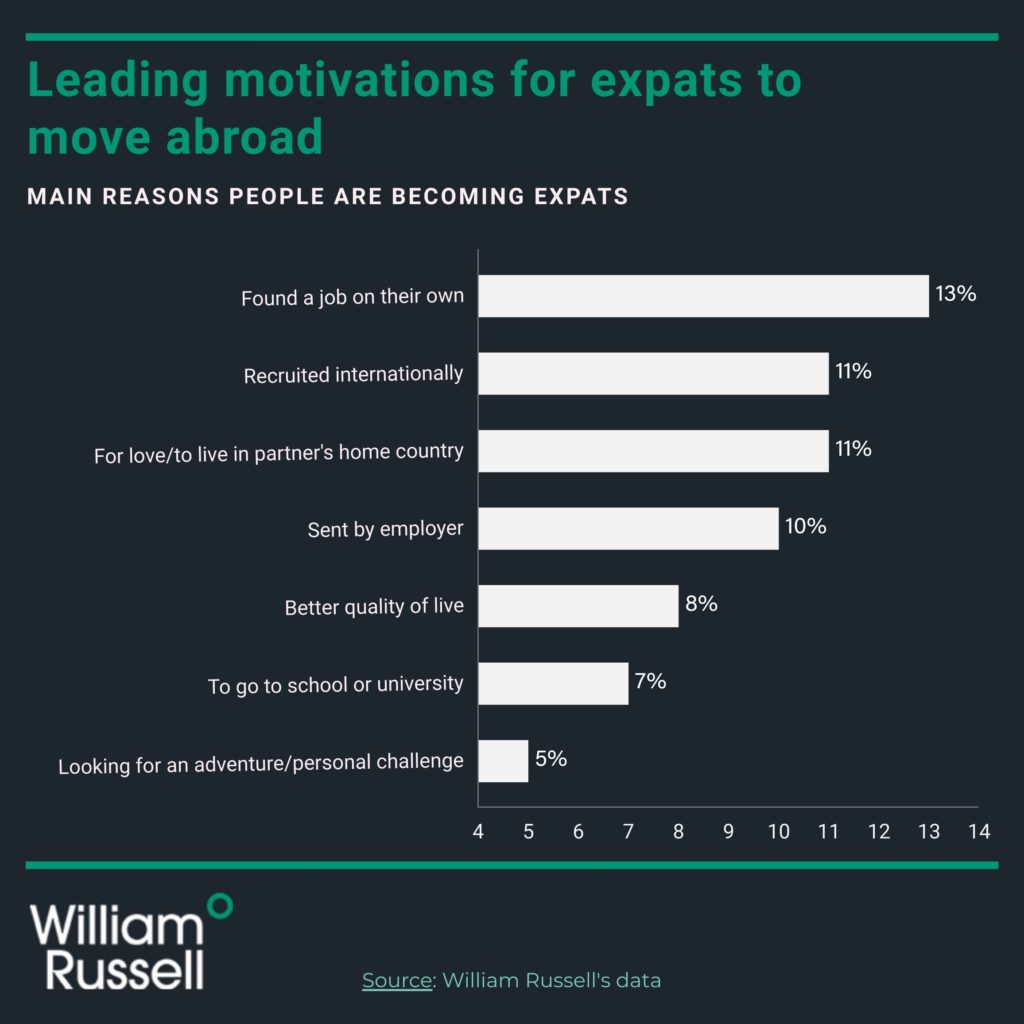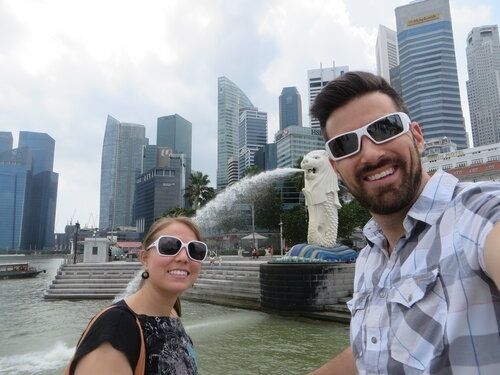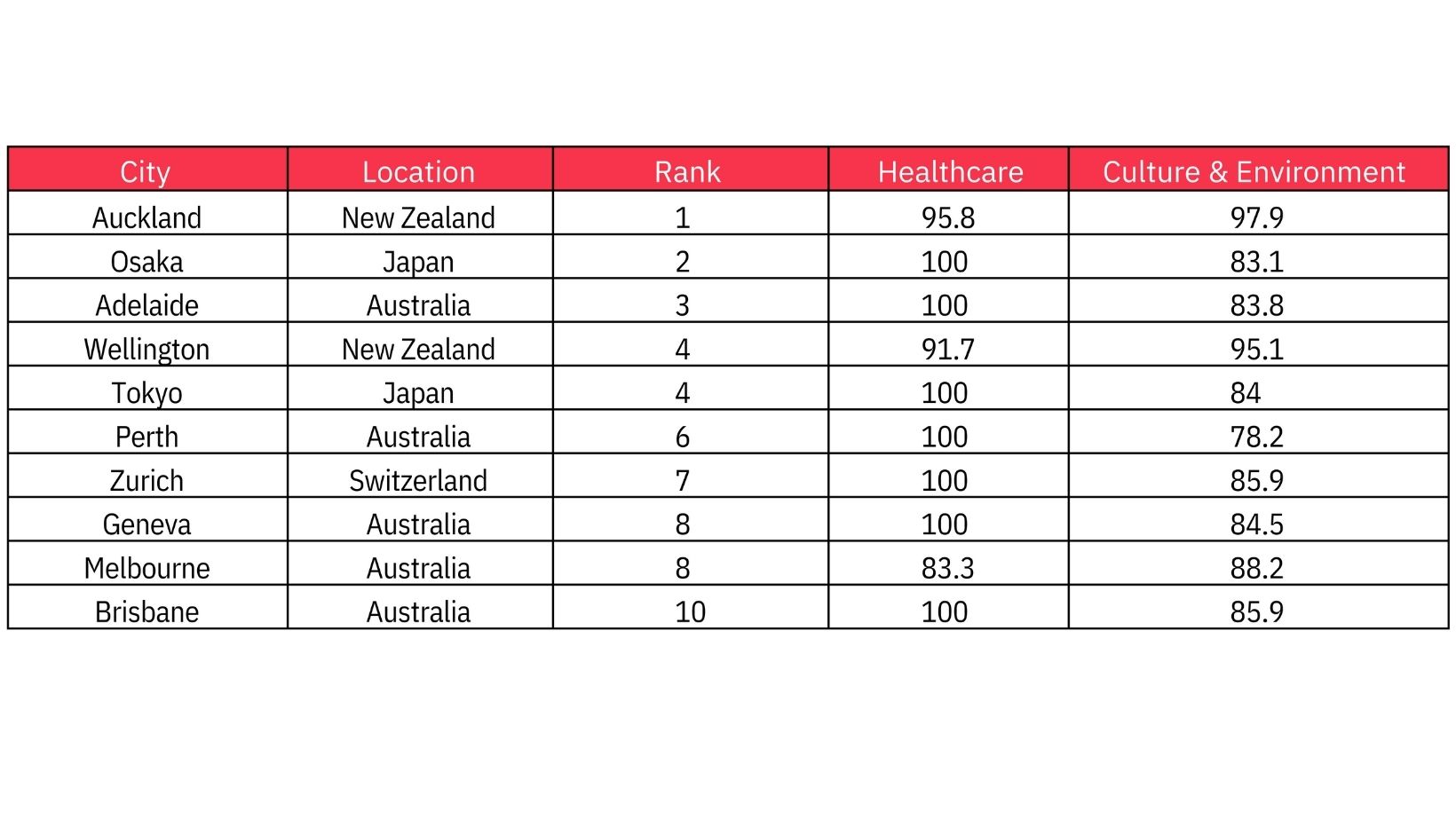Contact Us
Company Registered in Borgo Berga, Vicenza, Italy, 36100.
Registration Number (Partita Iva) 04299640245. Operating Worldwide.
JPM Business Solution
With 195 countries in the world, moving abroad and becoming an expat is an enchanting idea. Moving overseas is an enormous decision though and it means changes and rewards at the same time. It raises a lot of questions before you move: how do I find a job? How do I plan to move overseas? Do I need visa? Where will I live? What will it be like there? How much does it cost to move overseas?
This year, there is one more important question to consider though: can I move overseas during Covid? Moving abroad these days requires even more careful research. To help you answer all these questions, we’ve prepared our expat guide. Find out whether you can move during the pandemic, how to prepare for a move overseas, and how to make the most of it. Get our helpful step-by-step checklist to help you move!
The pandemic has affected expats worldwide with many finding that their priorities shifted, both in terms of finances and quality of life. But many people made the leap before. And others are planning to follow, with many considering moving abroad in 2022, particularly young professionals and families with children and teenagers.
Several factors play in to the desire to experience life in another country in 2022. There is people’s increasing awareness of the importance of fulfilling their dreams, as well as the urge to escape the monotony of lockdown. The huge rise in remote working has also made it possible for many professionals to work from anywhere – including another country.

And why wouldn’t you? 74% of expats increase their income in their new country, according to HSBC’s latest Expat Explorer study.
As well as the financial benefits, moving abroad can open your eyes to different ways of living – and satisfy the wanderlust that’s been growing in you since the lockdown started.
Moving abroad is stressful enough at the best of times, and this is certainly closer to the worst of times. Expat life has always varied according to your reasons for moving abroad, where you choose to live and whether you move alone or with family. The pandemic has caused additional challenges for many expats with the severity of lockdowns in European countries, and xenophobia on the rise in some destinations.
Civil unrest and political uncertainty is also affecting some countries – from the US, where COVID-19 safety is also a concern – to Hong Kong. Plus, there are fears about ostracization in COVID-secure societies such as South Korea and Taiwan.
However, many of the current challenges will subside, and there are tens of thousands of expats who would not consider returning home as they enjoy the climate and quality of life in their adopted countries, among other factors.
Josh and Kalie, expats and content creators for ExpatsEverywhere.com

Moving abroad or to a different country during the pandemic: how was your experience?
Honestly, it wasn’t bad. A few extra steps with Covid tests and needing to show various proofs meant that we had to organise a little more on the front end, but the flight itself was great. Once arriving in Portugal, the restrictions at the time were a bit less than what they were in the US
although that’s now flipped. Overall, it was a fine experience and we think that it was so smooth because of our amount of experience moving from country to country. We kind of knew to expect the unexpected. Hope for the best, plan for the worst, and know anything is possible.”
According to our mental health survey, a lot of expats were happy being in their country of residence during the pandemic. As always, the best advice is to do your research before you move abroad and talk to other expats.
The COVID-19 has been creeping its way across the globe since December 2019, and has now evolved into a full-scale global pandemic. Almost every person in the world has been affected in some way – some are having to contend with themselves or their loved ones contracting the virus, while others are swiftly adjusting to an indefinite period of self-isolation and social distancing. Meanwhile, due to national and global travel restrictions, a lot of people are currently living in limbo, with their dream move abroad now suddenly on hold. But there is now a light at the end of the tunnel. Recent events might have put dreams of leaving the country on hold but, now that restrictions are beginning to lift, it’s likely many more of us will again be looking at moving abroad.
Natalie Deduck, expat in Italy from Brazil, journalist and content creator for Love and Road and The Best of Turin
“How did your return to your home country go during the Covid-19 pandemic?
Because of the travel restrictions, we couldn’t leave Italy to go back to Brazil, our home country. It was a tough year to be an expat in Italy, and as much as we love the country, it was hard to be locked in one place. Only by the end of 2020, when restrictions were softened, that we

managed to get back to Brazil. After 14 hours journey and three airport connections, we were back at Itajaí, our hometown in Southern Brazil. It’s good to be back, we are still facing restrictions, but nothing beats the feeling of being close to our loved ones. We do miss Italy, but we are waiting for the world to heal then we can go back to international traveling.”
Moving abroad during COVID requires careful research. Not only do you have to consider which countries are accepting new citizens, but you must also take into account factors like healthcare, the nation’s response to COVID-19, the culture, and more.
To begin with, if you’re planning on relocating, pay close attention to the countries that have dealt better with the spread of COVID-19. The Global Liveability Index 2021, a report by the Economist Intelligence Unit, puts Auckland, in New Zealand, at the top of the cities to consider in that respect, owing to the city’s ability to contain the coronavirus pandemic faster and thus lift restrictions earlier, unlike others around the world. The city largely remained open and it scored strongly on a number of metrics including education, culture and environment.
10 of the most liveable cities in the world in 2022
| City | Location | Rank | Healthcare | Culture & Environment |
| Auckland | New Zealand | 1 | 95.8 | 97.9 |
| Osaka | Japan | 2 | 100.00 | 83.1 |
| Adelaide | Australia | 3 | 100.00 | 83.8 |
| Wellington | New Zealand | 4 | 91.7 | 95.1 |
| Tokyo | Japan | 4 | 100.0 | 84.0 |
| Perth | Australia | 6 | 100.0 | 78.2 |
| Zurich | Switzerland | 7 | 100.0 | 85.9 |
| Geneva | Australia | 8 | 100.0 | 84.5 |
| Melbourne | Australia | 8 | 83.3 | 88.2 |
| Brisbane | Australia | 10 | 100 | 85.9 |

* Source: The Liveability Index 2021 by The Economist Intelligence Unit.
Several countries were capitalising on the moving abroad trend in 2021, supporting expats and digital nomads. Dubai, for example, has launched a one-year virtual working programme, specifically aimed at attracting working professionals. It’s also offering free coronavirus vaccinations to some expats. Barbados has a similar programme – the Welcome Stamp – aimed at remote workers.
In Europe, Finland has introduced the ’90-day Finn’ scheme, which gives foreign tech professionals the chance to move to the country for 90 days to see if they want to live there permanently. And Greece is offering tax breaks to attract expats.
Forbes lists Portugal, Spain and France among its top 10 places to move to in 2021. Switzerland, Singapore and New Zealand are popular too.
You can also consider Switzerland, Singapore, New Zealand, Germany and Spain, according to the latest research by HSBC.
Charlie Clissit, journalist and content creator for MoveHub, global relocations company.

“How much does it cost to move overseas?
This is always a tricky one to answer because it just depends on so many factors; how much stuff you’re bringing, how valuable it is, whether you insure it, what kind of visa you need, how many family members you’re bringing, what size property you move into, how long you’re planning on living there for. One person’s move to Australia could easily be cheaper than another person’s
move to Spain. In terms of living costs, it’s all the usual culprits (Switzerland, Scandinavia, Japan, Singapore etc.) – these are best avoided if you’re on a tight budget.”
below the most important stages of moving abroad and becoming an expats, together with some tips from people who have already moved abroad. There are dozens of different aspects to consider – so here are some of the main factors that’ll help you make your mind up.
Above we have covered countries that might be best for relocation, depending on your individual situation. Now let’s talk more about the specifics of becoming an expat.
When you start your relocation process and start to check for the document requirements, you will visit a government website that lays out the different visa options, and how you can qualify for them. Every government has it, but sometimes you might have to use the online translator function (there is one in Google Chrome, for example).
Read carefully, follow the instructions to the letter, and work out how much you’ll have to pay ahead of time, so you can budget it in.
There’s no point in choosing a country, only to be refused entry. Ascertain how easy it is to move to the destination you have in mind, and check whether it’s possible to test drive your potential new home.
If you speak multiple foreign languages, the world is your oyster. If you don’t know any, you may want to limit your search to countries that are English-speaking, like Canada, the US, Australia, New Zealand, and Barbados. And of course, there are plenty of nations which are exceptionally good at teaching their populace English as a foreign language, like Sweden, Singapore, and the Netherlands.
But how can you learn the language as a new expat? Thanks to the abundance of digital technology we can access while sitting at home, you can learn a new language from the comfort of your own sofa. For example:
Meg Jerrard, expat blogger, content creator for Mappingmegan.com.
“How to be expat in the country where you are based now? What was the biggest challenge? From America to Australia, funnily enough the biggest challenge was the language barrier – which may sound surprising considering both countries speak English, however there are many slang terms, as well as different words, phrases and ways of describing everyday things, which we’re still working through 8 years later!”

Becoming an employed, contributing member of society is generally the best way to convince the authorities that you deserve a temporary visa, never mind permanent residence.
We recommend getting a job before you make your move. If you’re taking a brave step into the unknown without paid work, be sure to get well-acquainted with job sites, and hit the ground running when you arrive to find a role as soon as you can.
Check living costs around the world before you make your decision, or you may not be able to enjoy your new life to its fullest. On the other hand, a wise financial choice can lead to you living in comfort for the rest of your years.
The world is collectively going through a strange financial time: mortgages are being frozen, wages are being paid by the government, and energy bills are even being paused in some countries. Before you make your move abroad, you might want to brush up on the latest news about whether your new country has been affected by these changes – and whether they’ll be ongoing by the time you move.
Don’t worry, there’ll still be plenty to sort out after you’ve moved abroad.
You’ll need to purchase plans for the following:
And of course, you’ll have to find your local supermarket, baker, and fruit and veg shops. In all of these decisions, the key is research – so prepare as much as possible, and ask locals for their opinions after you’ve arrived.
When it comes to Netflix, you’ll continue to pay the same amount, in pounds, when you move countries. If you’d rather pay the local price, just cancel your account the day before the end of your month, then restart it the next day.
And don’t worry: Netflix is available in these 190 countries.
Likewise, if you’re signed up to Amazon Prime Video, it’s available everywhere apart from mainland China, Iran, North Korea, and Syria.
However, if you’re moving outside the European Union (EU) – or if you’re reading this after 2020 has ended – you’ll be limited to watching Amazon Originals.
If there’s one thing we can be sure of right now, it’s that everyone is in the same boat when they move abroad. Joining an online expat community can support you in the months ahead, and can help you connect with people in similar situations.
Self isolation doesn’t have to stunt your move abroad. You can learn the ins and out of your new town or city through online expat communities: ask questions, connect with expats in your area-to-be, take a look at other people’s queries, and who knows – you might even meet people going through the same thing.
There are global expat websites which divide into area-specific communities.
This is where a 90-day test drive will be particularly useful, but there are quicker ways to work out whether another country’s culture meshes with your approach to life.
Check out the United Nations’ World Happiness Report and the World Economic Forum’s Global Gender Gap Report, and research which nations are most tolerant of racial minorities and LGBT+ people.
Then look into which country excites you with its entertainment offerings, its approach to food and drink, and its national pastimes – and check out the working culture, too.
After all, there’s a big difference between France’s two-hour lunches, 35-hour weeks, and 30 holiday days, and the US’s mere 10 days of holiday.
In any case, it’s always a good idea to get some cross-cultural training so you are prepared to adapt to your new country.
Finding a new home, a new job, and new friends is stressful, but at least it’s exciting. Tying up loose ends is not exciting, but it’s necessary. Once you’re done cancelling your subscriptions and saying goodbye to your friends, you’ll also need to communicate with the government about any benefits, pension, student loans, and taxes.
In most countries, if you live outside the country for a specified number of days, you will not be liable for paying tax. The fact that you’ll be living abroad should be communicated with the government, so they know you’re not liable for taxes during that period. Note: Only the US taxes on worldwide income, regardless of being a resident or not. There is an exemption if you earn up to a certain amount abroad, so if you’re from the US, please be sure to check as it changes from time to time.
Regarding voting and citizenship, you’ll almost certainly be able to vote in elections while living abroad, and you’ll remain a citizen too. If you want to vote by post or proxy, all you need to do is fill in the relevant document – just make sure to print it off first, as it can only be completed in paper form.
At this point, you’ll be ready to physically move yourself and all your most important belongings to your new home.
Shipping is by far the most efficient, least expensive way of making sure all your prized possessions follow you across the ocean in a safe and timely fashion.
Air freight is 12-16 times more expensive than sea freight, according to the World Bank, which makes it much less attractive.
Plus, from 2014 to 2016, ships transported an average of £9.3 trillion worth of cargo across the world – and 99.99% of containers travelled safely to their destination.
Your handy “moving abroad as an expat” checklist
We created our moving abroad checklist covering everything that you need to do before you move, and also important factors to consider in your first few months once you’ve moved abroad.
Thinking of moving abroad in 2022?
With the end of the pandemic in sight, there has never been a better time to think about starting a new life. Wherever you decide to move, just make sure you have the confidence of global health insurance. Our Partners, William Russell, have been providing worldwide health cover for 30 years, helping expats like you and their families to settle into their new homes. Speak to William Russell today to find out more about how global health insurance could support you.
Article provided by Damian Porter at William Russell.
by cherylobal | Jan 27, 2023 | Expat Life, Intercultural Skills | 0 Comments
by cherylobal | Jan 18, 2023 | Business Abroad, Expat Life, Middle East | 0 Comments
by cherylobal | Jan 18, 2023 | Business Abroad, Expat Life, Intercultural Skills, Middle East | 0 Comments
Company Registered in Borgo Berga, Vicenza, Italy, 36100.
Registration Number (Partita Iva) 04299640245. Operating Worldwide.
JPM Business Solution
| Cookie | Duration | Description |
|---|---|---|
| cookielawinfo-checbox-analytics | 11 months | This cookie is set by GDPR Cookie Consent plugin. The cookie is used to store the user consent for the cookies in the category "Analytics". |
| cookielawinfo-checbox-functional | 11 months | The cookie is set by GDPR cookie consent to record the user consent for the cookies in the category "Functional". |
| cookielawinfo-checbox-others | 11 months | This cookie is set by GDPR Cookie Consent plugin. The cookie is used to store the user consent for the cookies in the category "Other. |
| cookielawinfo-checkbox-advertisement | 1 year | Set by the GDPR Cookie Consent plugin, this cookie is used to record the user consent for the cookies in the "Advertisement" category . |
| cookielawinfo-checkbox-necessary | 11 months | This cookie is set by GDPR Cookie Consent plugin. The cookies is used to store the user consent for the cookies in the category "Necessary". |
| cookielawinfo-checkbox-performance | 11 months | This cookie is set by GDPR Cookie Consent plugin. The cookie is used to store the user consent for the cookies in the category "Performance". |
| CookieLawInfoConsent | 1 year | Records the default button state of the corresponding category & the status of CCPA. It works only in coordination with the primary cookie. |
| viewed_cookie_policy | 11 months | The cookie is set by the GDPR Cookie Consent plugin and is used to store whether or not user has consented to the use of cookies. It does not store any personal data. |
| Cookie | Duration | Description |
|---|---|---|
| __cf_bm | 30 minutes | This cookie, set by Cloudflare, is used to support Cloudflare Bot Management. |
| Cookie | Duration | Description |
|---|---|---|
| _ga | 2 years | The _ga cookie, installed by Google Analytics, calculates visitor, session and campaign data and also keeps track of site usage for the site's analytics report. The cookie stores information anonymously and assigns a randomly generated number to recognize unique visitors. |
| _gat_gtag_UA_178010500_1 | 1 minute | Set by Google to distinguish users. |
| _gid | 1 day | Installed by Google Analytics, _gid cookie stores information on how visitors use a website, while also creating an analytics report of the website's performance. Some of the data that are collected include the number of visitors, their source, and the pages they visit anonymously. |
| CONSENT | 2 years | YouTube sets this cookie via embedded youtube-videos and registers anonymous statistical data. |
| Cookie | Duration | Description |
|---|---|---|
| ckid | never | This cookie is set by the provider Yieldoptimizer. This cookie is used to track visitors on multiple websites, inorder to serve them with relevant advertisement based on visitor's interest. |
| VISITOR_INFO1_LIVE | 5 months 27 days | A cookie set by YouTube to measure bandwidth that determines whether the user gets the new or old player interface. |
| YSC | session | YSC cookie is set by Youtube and is used to track the views of embedded videos on Youtube pages. |
| yt-remote-connected-devices | never | YouTube sets this cookie to store the video preferences of the user using embedded YouTube video. |
| yt-remote-device-id | never | YouTube sets this cookie to store the video preferences of the user using embedded YouTube video. |
| yt.innertube::nextId | never | This cookie, set by YouTube, registers a unique ID to store data on what videos from YouTube the user has seen. |
| yt.innertube::requests | never | This cookie, set by YouTube, registers a unique ID to store data on what videos from YouTube the user has seen. |
| Cookie | Duration | Description |
|---|---|---|
| SGPBShowingLimitationPage5221 | 1 day | No description |